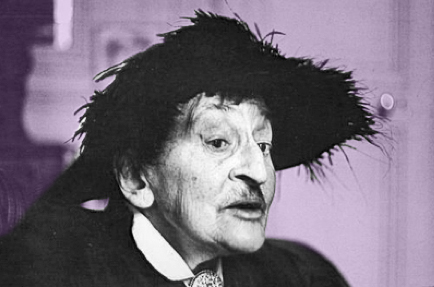
Alice B. Toklas writes to her friend L. Elizabeth Hansen, commenting on American composers, Bach, and Gertrude Stein’s aversion to reading aloud.
19 July 1949
5 rue Christine, Paris VI
Dearest Lilyana—
The young [Joe] Barrys who have just bought a charming house with a big garden high up in the woods above Montmorency which is just twenty kilometers from Paris asked me to stay with them. We have compromised—they accept me as a paying guest. It will be quite comfortable and agreeable and I go out there quietly without any railroad confusion in their car after Gertrude’s anniversary. In the old days anniversaries—other than Christmas and Gertrude’s birthday—never meant anything but now they do and everything is one. Do you know what I mean. And I have so many things to do.
Donald Gallup who is curator of American [Literature] at Yale University [Library]—really of all manuscripts—and who has been an angel to me—has been here for ten days and is coming back for two more—so I was busy with him—having him meet Gertrude’s friends. he is taking back with him my little early Picasso and the portrait of the poodle by Marie Laurencin and the red tape to get them out of the country—everything has to be passed by something called the office d’ échange beside having spent two hours at the American embassy for an affidavit—and only because I was Gertrude’s friend was I spared a second morning’s effort.
And the number of acquaintances and friends of acquaintances who have turned up and filled the flat is tiring to remember. But it has been so hot and dry that the arthritis—if it is that—is dormant for which I’m grateful.
At one moment it was very musical—a violinist—Angel Regus—was here and he gave a concert. Mozart and Bartok—yes why Bartok you may well ask—and then at a friends they played Bach and Bach and Bach and it was heavenly—not the playing but Bach—including the Italian suite—do you remember me pegging away at it—making a mess generally. And then there were some youngish Americans—whom we had known much younger—Paul Bowles and [John] Cage and Aaron Copeland—of whom the first has considerable endowment and more understanding—they did a concerto of his for two pianos—wind—and percussion instruments which interested me for a really American quality, not at all primitive but an approach to the sterner qualities of the Red Indian. Cage annoys me with a “prepared piano” and a Hindu—Tibetan—Japanese (?) scale. Aaron Copeland isn’t amusing—that was my intensive belated musical experience—the first since many years and probably the last. Of course I don’t count V. Thomson—he’s a continuation.
No you and Clare [de Gruchy] accomplished things. You lived and saw deeply and well and I of think this and you both often. Yes there’s Bach in Juan Gris—if you mean supreme discipline and order and no superficial melody or [word?] sensuousness. Ubu Roi as puppets. What’s this. I’ve no memory of it as approaching puppets—either in the beginning—middle or end. it was written either when he was still at the lycée of immediately after with a boy’s—especially a kind of French boy’s—exuberance and mockery and of course their great sense of drama. And that’s all. Anything more is just read in.
Gertrude didn’t like reading aloud because she just couldn’t tolerate being read aloud [to]. The French never give you a manuscript to read—they read it aloud to you or make an appointment to do so. This used to be a considerable annoyance to Gertrude. She never heard what was read to her. She thought that there were really two different things—the spoken language and the written prose as well as poetry. When the students used to ask her—Why don’t you speak as you write—she used to answer—Do you think Shelly [sic] spoke like the “Ode to the Nightingale” or any other author like his written work. More like it perhaps than anyone else perhaps but not the same. As for the music which disengages itself more easily from a work when it is read aloud she said that was not intentional with her—music there was—particularly at one period—but that that was a by product. And still if people could enjoy reading aloud or being read aloud to—she was all for everyone’s getting their pleasure in their own way. In one of the conversations with Picasso after the liberation she was saying more or less this ending with—I read with my eyes not my ears—ears are inside me. To which Picasso said—Of course writers write with their eyes painters paint with their ears. And further neither painters nor writers have ever been painted with their mouths open. Well I’ve gotten to the end of the subject—of the page—of your patience and my time. Hurrah for December when Agnes and you will be over.
Fondest love always
Alice
FURTHER READING
Click here for a more in-depth look into the life of Alice B. Toklas and her inspiring relationship with Gertrude Stein.
For a website devoted to capturing the unintentional music of Stein’s prose, click here.


